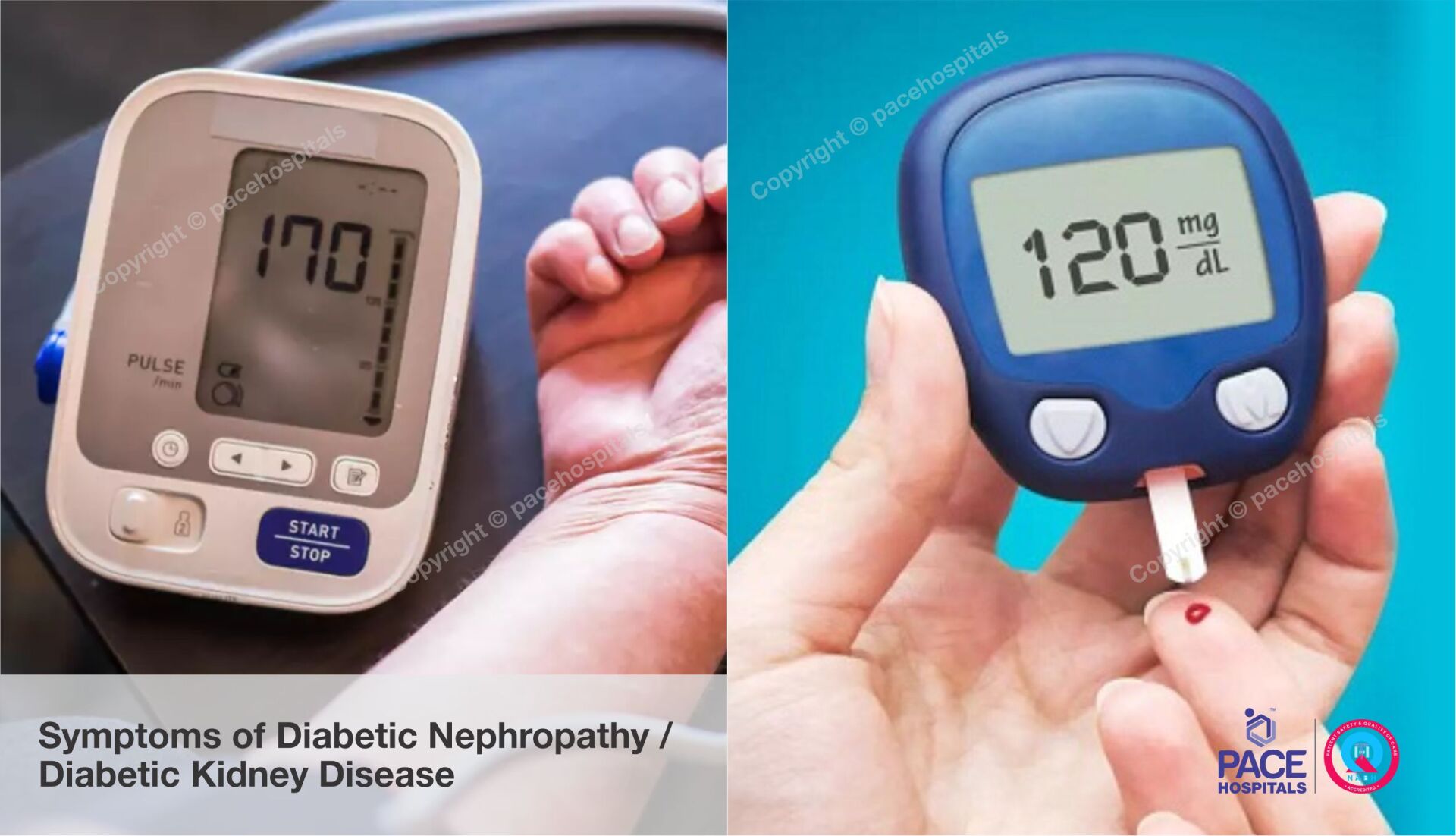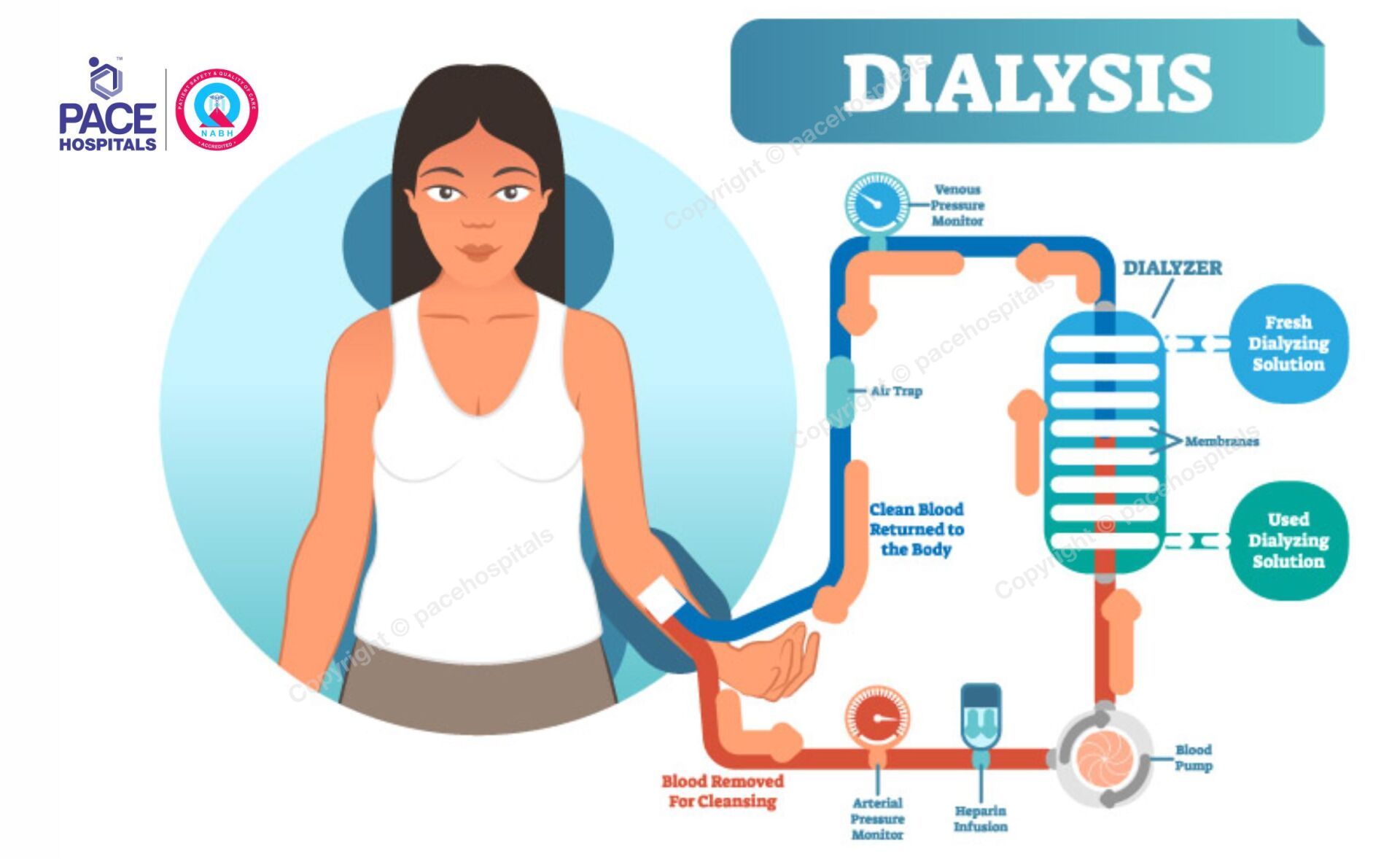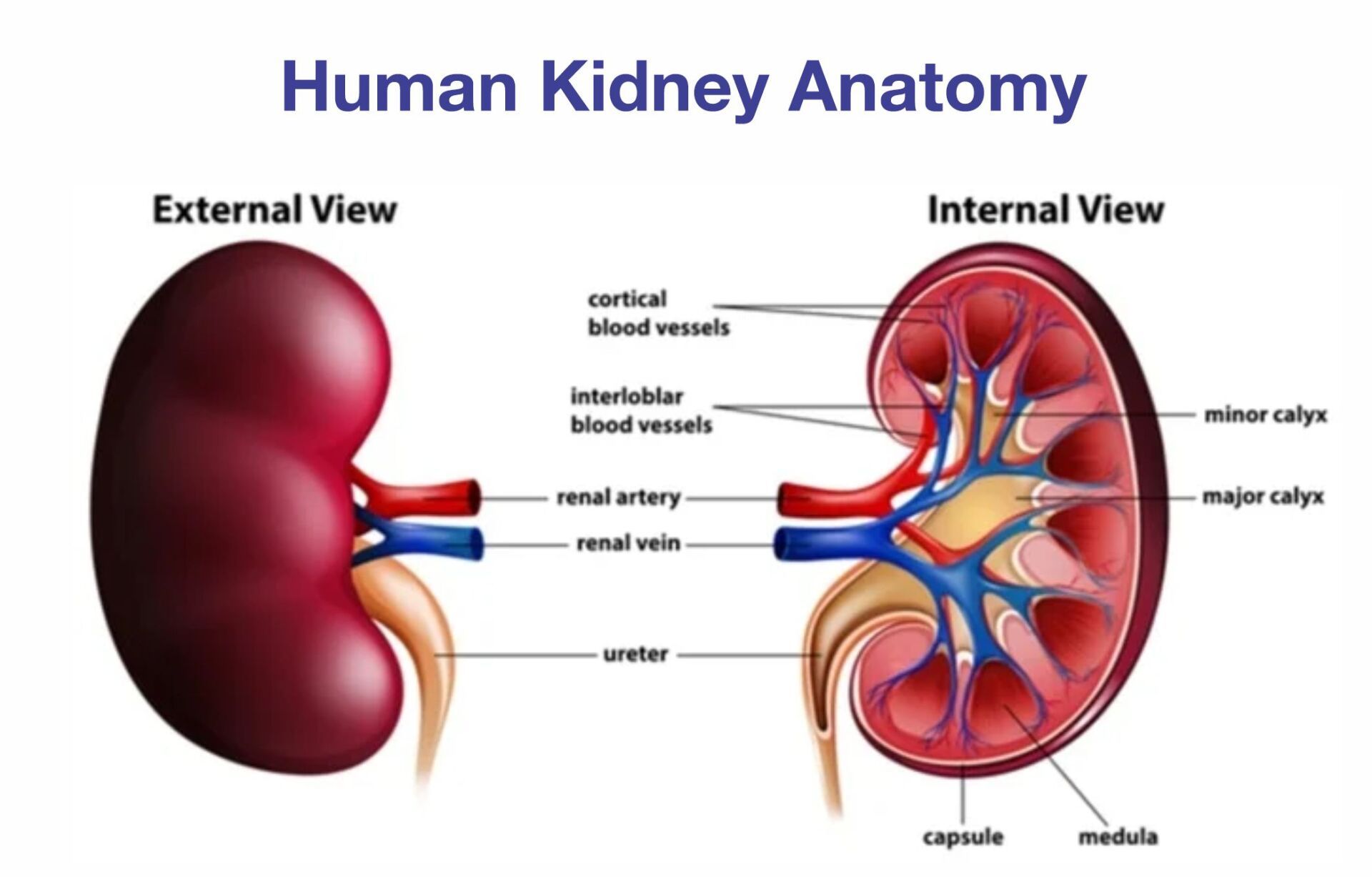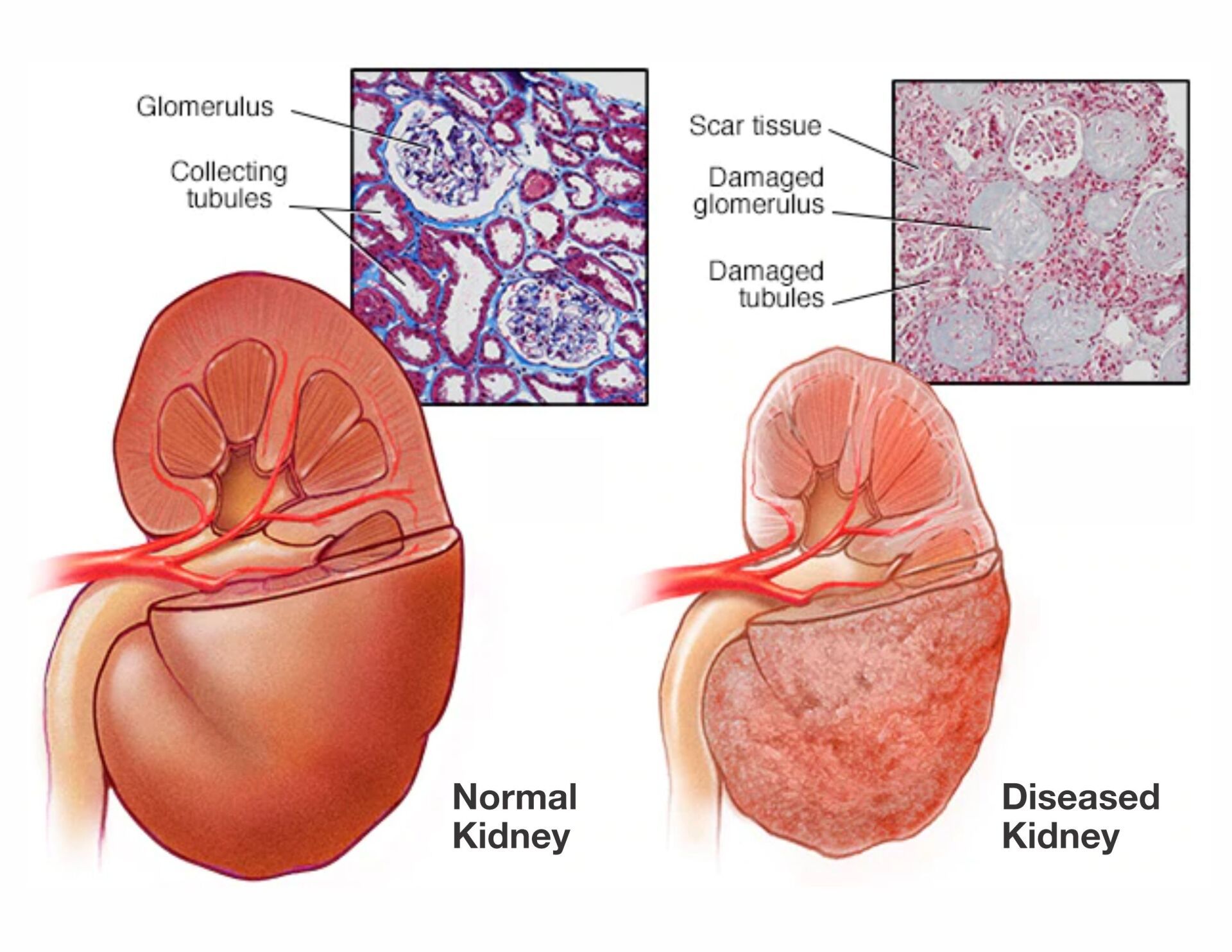Diabetic Nephropathy or Diabetic Kidney Disease
Diabetic Nephropathy or Diabetic Kidney Disease is a type of kidney disease that occurs in some people who have diabetes.
Leading cause of kidney disease is diabetes, 30 percent of patients with Type 1 diabetes and 10 to 40 percent of those with Type 2 diabetes suffer from Diabetic kidney disease. This means the kidneys are not doing their functions, like filter wastes and extra water out of your blood to make urine. Human kidneys (Figure 1) also help control blood pressure and make hormones to stay healthy and active.
What is the first sign of Diabetic Nephropathy / Diabetic Kidney Disease?
Initial stage there are often no symptoms. The early sign of diabetic kidney disease is an increased excretion of albumin in the urine, we advise all to do yearly checkup so that Diabetic Nephropathy (Figure 2) can be identified in initial stages.
Prevalence
The prevalence of DN is mostly in Type 2 diabetic patients, 20-40% with microalbuminuria (MA) progress to manifested nephropathy after 20 years from the onset of diabetes; approximately 20% develop end-stage renal disease (ESRD).
The risk of developing diabetic nephropathy (DN) starts with albuminuria, progressing from microalbuminuria to macroalbuminuria. It is recommended that all Type 2 diabetic patients should do annual microalbuminuria urine test, starting at the time of diagnosis. This prevalence was ranging between 25% in patients younger than 65 years old to nearly 50% with age older than 65 years (22)
Symptoms
As the kidney function worsens, these signs and symptoms indicate Diabetic Kidney Disease :
- Nausea, Vomiting and Poor appetite
- Anemia (a low blood count)
- High blood pressure
- Morning sickness
- High levels of BUN and creatinine in blood
- Trouble sleeping or concentrating
- Difficulty thinking clearly
- Weight loss
- Drowsiness
- Extremely dry skin and itching
- Muscle cramps (specially in your legs)
- Weakness, paleness
- Fluid retention due to that swollen feet and ankles
- Puffiness around the eyes
- Needing to pass urine more frequently
Causes and Risk factors
High blood sugar, can damage the blood vessels in your kidneys due to that they don’t work as well. Many people with diabetes also develop high blood pressure, which can also damage your kidneys.
Your risk of Diabetic Kidney Disease is greater if you have type 1 or type 2 diabetes. Several other factors may increase your risk of Diabetic Kidney Disease that includes:
- Smoking
- High blood pressure (hypertension)
- High cholesterol (hypercholesterolemia)
- High blood sugar (hyperglycemia)
- A family history of kidney disease and diabetes
Diagnosis
To determine whether you have diabetic kidney disease, these tests and procedures can help, such as:
- Blood tests. If you have diabetes, you will need blood tests to check levels of BUN and creatinine and monitor your condition that will determine how well your kidneys are working.
- Urine tests.
Urine samples provide information whether you have too much protein in the urine. High levels of a protein (microalbumin) may indicate your kidneys are being affected.
- Imaging tests. X-rays and ultrasound are advised to assess your kidneys' size and structure. Some of the cases CT scanning and magnetic resonance imaging (MRI) will ne advised to determine how well blood is circulating within your kidneys.
- Renal function test. to assess your kidneys' filtering capacity using renal analysis testing.
- Kidney biopsy. After other diagnostics, nephrologist may recommend a kidney biopsy to remove a sample of kidney tissue. Watch here details about Kidney Biopsy
How is Diabetic Kidney Disease treated?
Medications: In the early stages of diabetic nephropathy, treatment plan may include various medications to control the causes of it:
- Manage and Control high blood sugar:
Keep track of your blood sugar levels to see what makes them go up or down; eat at regular times, and don't skip meals; choose foods lower in calories, saturated fat, trans fat, sugar, and salt; Track your food, drink, and physical activity; Drink water instead of juice or soda.
- Lower high cholesterol: Reduce saturated fats that found primarily in red meat and full-fat dairy products that can raise your total cholesterol; eliminate trans fats; eat foods rich in omega-3 fatty acids; increase soluble fiber.
- Controlling protein albumin in the urine: Follow dietary changes, try to maintain healthy weight. Losing weight can manage conditions that impair kidney function; blood pressure medication and diabetes medication can help in controlling protein in Urine (proteinuria), and lastly dialysis that filters and purifies the blood using a machine.
- Maintaining healthy bones: Include plenty of calcium in your diet and physical activity in your daily routine, pay attention to vitamin D, avoid substance abuse like don't smoke and avoid drinking alcohol.
Treatment for advanced diabetic nephropathy
When it progresses to end-stage kidney disease (kidney failure), doctor will help you in focused care on managing the function of your kidneys to make you more comfortable, such as:
- Dialysis: Dialysis is a treatment that filters and purifies the blood using a machine. This helps keep your fluids and electrolytes in balance when the kidneys can't do their job. Dialysis has been used since the 1940s to treat people with kidney problems.
- Kidney transplant: A kidney transplant is a surgical procedure to place a healthy kidney from a living or deceased donor into a person whose kidneys no longer function properly.
- Managing Symptoms: If you choose not to have dialysis or a kidney transplant, your life expectancy generally would be only a few months. Doctor likely to work on management of the diabetic nephropathy symptoms to help keep you comfortable.
Upcoming treatment
In the future, people with diabetic nephropathy may benefit from regenerative medicine treatment. This technique may help slow down or reverse kidney damage caused by the disease. This technique, however, are still investigational. In addition, researchers are testing stem cells technique and several new medications for diabetic kidney disease.
-
Healthy Diet and Regular Exercise
ButtonLifestyle habits can support your blood glucose and blood pressure goals.
Maintain or develop healthy lifestyle habits
Lifestyle habits can support your blood glucose and blood pressure goals. Depending on your situation, kidney function and overall health, these may include:
- Maintaining a healthy weight - limit portion size to control calorie intake, be as physically active as you can be, talk to your doctor about your weight if you think that you weigh too much or too little.
- Being active - make habit for at least 30 minutes of physical activity most days of the week.
- Stop smoking and alcohol intake - If you're a smoker then quitting smoking will help to reach goals.
- Get enough sleep - make habit for 7 to 8 hours of sleep each night.
- Adjusting your diet - Work with a dietitian to develop a diabetes meal plan and limit salt and sodium.
-
Human Kidney Anatomy
ButtonFigure 1 describes the internal and external view of kidney.
-
Normal vs Diseased Kidney
ButtonFigure 2 describes the Normal Kidney and Diseased Kidney
-
Kidney Biopsy
Button3. Video Representation - Kidney Biopsy : Indications, Preparation and Procedure | Dr A Kishore Kumar
FAQs
- Can you reverse kidney damage caused by diabetes?
You can't reverse kidney damage due to diabetic kidney disease. However, further damage can still be minimized by managing and controlling high blood sugar, lower high cholesterol, controlling protein albumin in the urine, maintaining healthy bones.
- What should I do when my kidney fails?
If your kidneys stop working completely, your body fills with extra water and waste products. There are two treatments for kidney failure - 1. dialysis and, 2. kidney transplant.
The dialysis treatments or transplanted kidney will take over some of the work of your damaged kidneys and remove wastes and extra fluid from your body. This will make many of your symptoms better.
- What are the risk factors?
Your risk of diabetic kidney disease is greater if you have type 1 or type 2 diabetes. Several other factors may increase your risk of diabetic kidney disease, including:
- High blood pressure (hypertension)
- High blood sugar (hyperglycemia)
- High blood cholesterol
- Smoking
- A family history of diabetes and kidney dysfunction
Our Locations
Subscribe to our newsletter and stay updated with the latest health information.
By clicking on subscribe now, you accept to receive communications from PACE Hospitals on email, SMS and Whatsapp.
Subscribe to PACE Hospitals News
Thank you for subscribing. Stay updated with the latest health information.
Oops, there was an error. Please try again submitting your details.
-

Payment in advance for treatment (Pay in Indian Rupees)
For Bank Transfer:-
Bank Name: HDFC
Company Name: Pace Hospitals
A/c No.50200028705218
IFSC Code: HDFC0000545
Bank Name: STATE BANK OF INDIA
Company Name: Pace Hospitals
A/c No.62206858997
IFSC Code: SBIN0020299
Scan QR Code by Any Payment App (GPay, Paytm, Phonepe, BHIM, Bank Apps, Amazon, Airtel, Truecaller, Idea, Whatsapp etc)
Call us at 04048486868
ADDRESS
PACE Hospitals
Hitech City : Beside Avasa Hotel, Pillar No. 18, Hyderabad - 500081
Madinaguda: Mythri Nagar, Beside South India Shopping, Madinaguda, Hyderabad - 500050
QUICK LINKS
Disclaimer
General information on healthcare issues is made available by PACE Hospitals through this website (www.pacehospital.com), as well as its other websites and branded social media pages. The text, videos, illustrations, photographs, quoted information, and other materials found on these websites (here by collectively referred to as "Content") are offered for informational purposes only and is neither exhaustive nor complete. Prior to forming a decision in regard to your health, consult your doctor or any another healthcare professional. PACE Hospitals does not have an obligation to update or modify the "Content" or to explain or resolve any inconsistencies therein.
The "Content" from the website of PACE Hospitals or from its branded social media pages might include any adult explicit "Content" which is deemed exclusively medical or health-related and not otherwise. Publishing material or making references to specific sources, such as to any particular therapies, goods, drugs, practises, doctors, nurses, other healthcare professionals, diagnoses or procedures is done purely for informational purposes and does not reflect any endorsement by PACE Hospitals as such.






